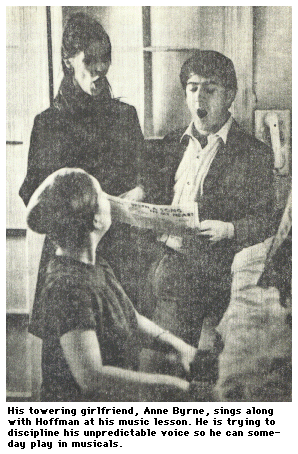|
A swarthy Pinocchio
makes a wooden role real

 f
Dustin Hoffman's face were his fortune, he'd be
committed to a life of poverty. With a schnoz that
looks like a directional signal, skittish
black-beady eyes and a raggedy hair-cap, he stands
a slight 5-foot-6, weighs a mere 134 pounds and
slouches like a puppet dangling from a string. All
in all, he resembles a swarthy
Pinocchio. f
Dustin Hoffman's face were his fortune, he'd be
committed to a life of poverty. With a schnoz that
looks like a directional signal, skittish
black-beady eyes and a raggedy hair-cap, he stands
a slight 5-foot-6, weighs a mere 134 pounds and
slouches like a puppet dangling from a string. All
in all, he resembles a swarthy
Pinocchio.
Yet this unlikely leading
man has gone from off-Broadway character actor to
Hollywood star in one nimble leap. Mike Nichols,
comedian-turned-director whose first film effort
was the Oscar-bedecked Who's Afraid of
Virginia Woolf?, plucked Dusty out of
nowhere and made him the non-hero of his new film,
The Graduate. The role is that of an
innocent college graduate, named Ben Braddock,
catapulted into a corrupting world. The script
depicts him as well-fed, well-bred and handsome --
a "walking surfboard," Dusty calls him. At 30, he
was a decade older than the character, but Nichols
gambled that Dusty's talents would triumph over his
appearance. He has won his gamble.
 This
will astonish a lot of people, including the
actor's own family. Named Dustin by his
movie-struck mother after the cowboy star of the
silents, Dustin Farnum, he grew up in Los Angeles
trying to emulate the weakling in the Charles Atlas
ad by lifting tons of weights (the only muscles he
developed were in his neck, which now measures a
mighty 16 1/2) and making believe he was somebody
else. When he was 18 and at Aunt Pearl's for the
Passover feast, the grownups started quizzing the
kids about later life. Dusty blurted out, "I-I'm
going to be an actor." "You can't be an actor,"
decreed Aunt Pearl. "You are not good-looking
enough." This
will astonish a lot of people, including the
actor's own family. Named Dustin by his
movie-struck mother after the cowboy star of the
silents, Dustin Farnum, he grew up in Los Angeles
trying to emulate the weakling in the Charles Atlas
ad by lifting tons of weights (the only muscles he
developed were in his neck, which now measures a
mighty 16 1/2) and making believe he was somebody
else. When he was 18 and at Aunt Pearl's for the
Passover feast, the grownups started quizzing the
kids about later life. Dusty blurted out, "I-I'm
going to be an actor." "You can't be an actor,"
decreed Aunt Pearl. "You are not good-looking
enough."
Dusty tried anyway. He set
forth for New York, where he was sure his face
would be less conspicuous. For six years he was
just another one of those driven, twitchy actors
around town. "I wanted to play character roles," he
recalls. Suddenly he got them, appearing in a
series of off-Broadway plays as a middle-aged
Russian clerk, as a Chaplinesque Cockney hippie and
as a lame, hunchbacked Nazi homosexual.
He was aghast when Nichols
beckoned him to Hollywood to try a non-character
part. He found himself at the screen test sitting
on a bed and instructed to play a love scene with
Katharine Ross. "I'd never asked a girl in acting
class to do a love scene," he says. He adds, "No
girl asked me, either."
Hoffman looked at Miss
Ross, sexy in the prescribed wholesome manner. "A
girl like that," he said to himself, "would never
go for a guy like me in a million years." Miss Ross
shared the sentiment. Her first impression of her
impossible lover: "He looks about 3 feet tall, so
dead serious, so humorless, so unkempt. This is
going to be a disaster."
It nearly was. Dusty
couldn't do anything right. At one point he felt so
hapless, so helpless, so desperately in need of
something to reassure himself that he reached out
and grabbed Miss Ross by the behind. Then and there
Miss Ross advised Mr. Hoffman to keep his hands to
himself.
Despite, or because of,
all the faux passes, Nichols recognized
that Hoffman understood the sufferings of Ben
Braddock -- a stunned young man who senses that
something is rotten in his world but can't define
it. "He had a kind of pole-axed quality with life,
but great vitality underneath." He got the
part.
The agony of the screen
test persisted throughout the filming. "It's never
any fun for me," Hoffman says solemnly. "It doesn't
matter who I'm working for. I never enjoy it." He
often felt bludgeoned by Nichols.
"I get to you sometimes,
don't I? You just kind of clam up when I do,"
Nichols said.
"I guess that's true,"
Dusty agreed. "In New York I blow my top when
things aren't going right. But here I go to the
other extreme."
"That's no good," Nichols
said. "Just tell me to go to hell."
"I can't do that," said
Hoffman.
"Why not?" Mike
asked.
"You're the director," said
Dusty. And to the end of the filming, when things
were going badly, he was forced to agonize inside.
The results delighted Nichols. "On screen," he
says, "Dusty appears to be simply living his life
without pretending."
Dusty is one of the few
new leading men in Hollywood who look like people
rather than profiles in celluloid. Walter Matthau,
Lee Marvin, James Coburn, even Steve McQueen are
making it in movies despite of their not-so-ideal
looks. Of course, this doesn't move Dusty to forget
his face. Besides the mirror there are live
reminders. He met the eminent Joseph Levine, who
was financing the film for $3 million. "You know,"
confessed Levine after Hoffman left, "when he first
came in I thought he was one of the messenger
boys."
- David Zeitler,
Life, Nov. 24, 1967.
|